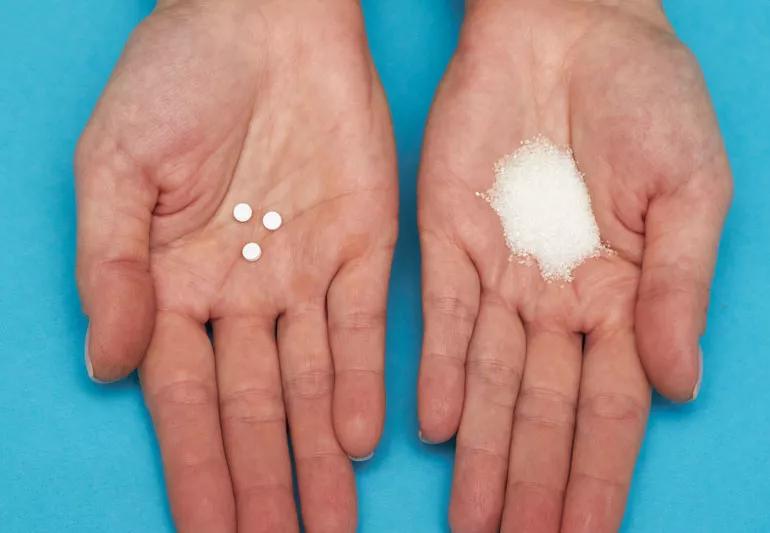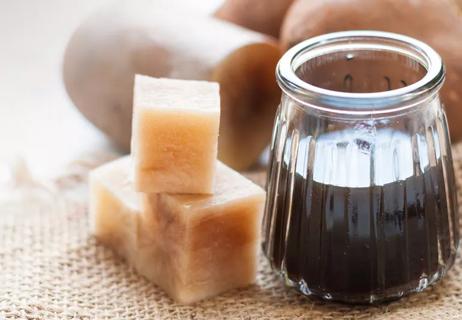Our expert weighs in on the sucralose vs. sugar debate

You know that too much sugar is the enemy of a healthy diet. So low-calorie sugar substitutes might seem like the perfect solution.
Advertisement
Cleveland Clinic is a non-profit academic medical center. Advertising on our site helps support our mission. We do not endorse non-Cleveland Clinic products or services. Policy
But is sucralose — aka Splenda®, aka the sweetener in the yellow packet — a healthy swap for the real thing? To find out if this popular artificial sweetener has a sour side, we spoke with registered dietitian Kate Patton, RD, to get the low-down.
There are a variety of artificial sweeteners available, all of which mimic the sweet taste of sugar (sucrose) without the calories. Sucralose is unique among artificial sweeteners because it’s made from real sugar. A chemical process tweaks its chemical structure, making it 600 times sweeter than sugar — and essentially calorie-free.
Fans like sucralose because it doesn’t have a bitter aftertaste, as some fake sugars do. That may be why it’s so hard to avoid. Sucralose is in everything from sugar-free gum and soda to ice cream and yogurt. And because it remains stable in heat, you can swap it for sugar in baked goods.
The U.S. Food and Drug Administration reviewed more than 110 safety studies before approving it as a sweetener in 1998. But since then, research has raised questions about the safety of sucralose. “Although it’s generally considered safe, there are some reasons for caution,” says Patton.
Lots of people reach for diet soda and calorie-free sweeteners to keep their weight in check. But the jury is still out on whether artificial sweeteners actually help you keep off the pounds.
Advertisement
Some studies have found no link between body weight and low-calorie sweeteners. Others have found that people who replace sugar with low-calorie sweeteners weigh ever-so-slightly less, on average — a difference, the researchers found, of fewer than two pounds.
On the other hand, some research suggests that people who drink diet soda might end up eating more calories in food than people who drink sugar-sweetened soda. In other words, sucralose isn’t a slam dunk when it comes to weight loss.
Your gut is home to an entire community of helpful bacteria. The microbiome has several important jobs, including helping with digestion and aiding your immune system. But some studies have found that sucralose might not be so great for those tiny helpers.
Research in rodents shows that sucralose upsets the microbiome balance, and that can lead to increased inflammation.
“We know long-term inflammation can contribute to a variety of problems, including obesity and diabetes,” says Patton. “But we need more data to find out if sucralose causes the same changes in human microbiomes as it does in animals.”
When you eat a sugary treat, your body produces the hormone insulin to help stabilize the sugar in your blood. People thought that artificial sweeteners wouldn’t have the same effect. That makes sugar-free sweeteners popular among people with diabetes, who need to monitor blood sugar levels closely.
But exactly how sucralose affects blood sugar and insulin levels is an open question. Some research suggests sucralose doesn’t raise blood sugar and insulin levels in healthy people.
But at least one study found that in people with obesity who didn’t normally eat artificial sweeteners, sucralose could raise both blood sugar and insulin levels. “We need more research to tease this out,” says Patton. “But instead of replacing sugar with sucralose, it’s a good idea to find other ways to cut back on sugar.”
“Sugar is addictive — and artificial sweeteners may be, too,” says Patton. Some studies hint that using a lot of sugar or artificial sweeteners just makes you crave more sugary foods and drinks.
It might seem daunting to cut back on the sweet treats you’re used to. But once your tastebuds adjust, you’ll reset your sweet tooth and start to appreciate the natural sweetness of foods like fruits.
So what’s the verdict on sucralose? It’s complicated.
It’s true that research has raised some concerns. Yet scientists haven’t found any direct negative health effects in people who consume sucralose long-term. That’s true both for healthy people and those with diabetes.
“While sucralose may cause problems at higher doses, most people consume nowhere near that amount,” says Patton. “If you enjoy sucralose occasionally and in moderation, it isn’t likely to have a major effect on your health.”
Advertisement
Learn more about our editorial process.
Advertisement

High fructose corn syrup is a common sweetener in packaged foods and can contribute to weight gain and inflammation

Erythritol is found in a range of ‘diet,’ ‘sugar-free’ and ‘keto-friendly’ foods — but research has linked it to heart attack and stroke

Although allulose is an FDA-approved sugar substitute, more research is needed to understand its safety

Studies and the FDA say this herbaceous alternative is safe in moderation, so go ahead and sprinkle away!

Xylitol in processed food can increase risk of heart attack and stroke — but there’s no danger in xylitol in oral care products

All-natural, plant-based and low-calorie, but it can also cause some serious digestive discomfort

Fruit is the best option for a healthy sweetener, but limit refined sugar and artificial sweeteners

Wearing a scarf, adjusting your outdoor activities and following your asthma treatment plan can help limit breathing problems

Your diet in the weeks, days and hours ahead of your race can power you to the finish line

When someone guilt trips you, they’re using emotionally manipulative behavior to try to get you to act a certain way